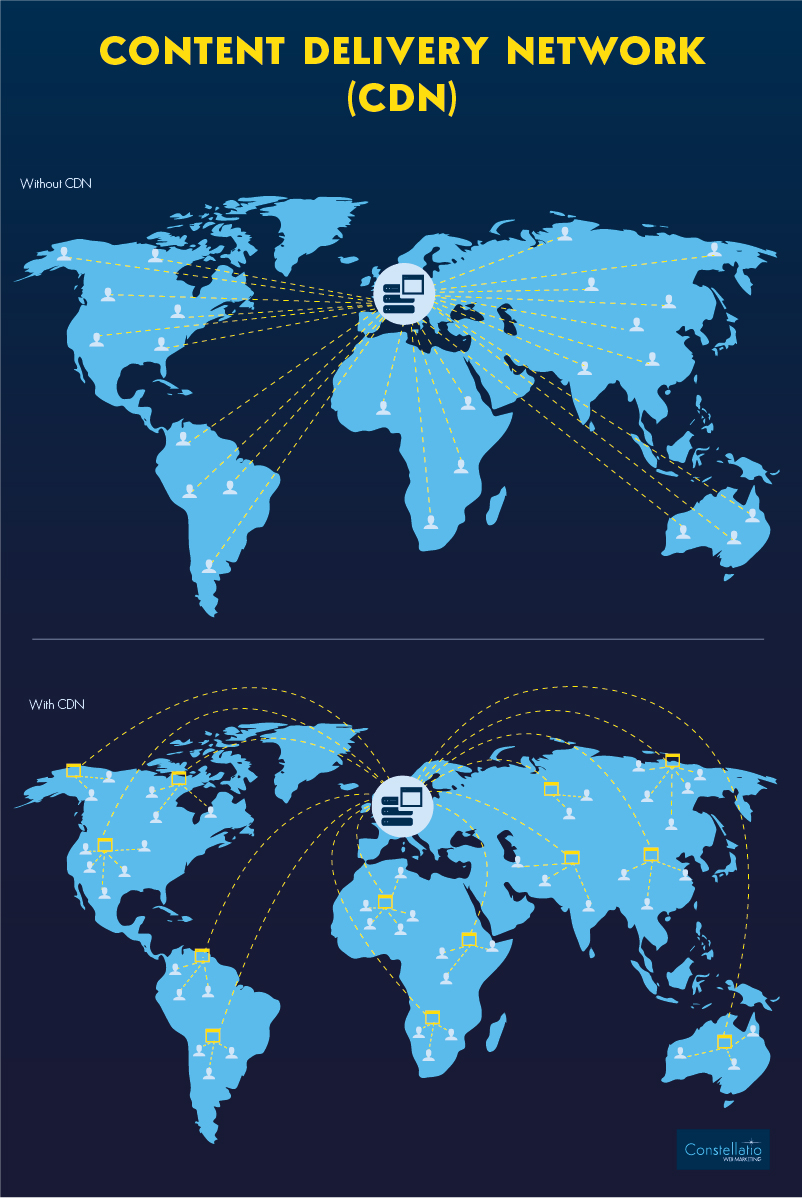The entire CDN network and its value for international indexing
The content delivery network (abbreviated as “CDN”) offers the user an improved experience, because the system optimizes data transmission by relying on a set of local servers. The above infographic compares the conventional centralized operation provided by a non-CDN host with a typical CDN decentralized operation. It’s the duplication of servers, and thus the duplication of copies of a website in various places throughout the world, which improves the distribution of the content. Thus, an original server may also have several peripheral servers, each hosting a replicated version of the source content.
Geographic proximity
This is the key to the operation of the Content Delivery Network (CDN): in order to minimize data transfer delays, the choice of the best peripheral server (i.e. the one closest to the user) follows predefined rules. Because proximity and loading time are related, the greatest improvements will always occur at user level. This is particularly true in the case of heavy data flows, such as will occur during video streaming.
CDN is a useful and reliable system with advantages for a strategy aimed at international development, and especially international indexing, in different geographical areas. Peak traffic flows are easily absorbed and user convenience is not undermined by unwelcome delays.
Note that this is not the ultimate answer for website positioning (because many other factors also come into play), but it is a real plus.
Google’s manifesto
In a striking publication called ‘The Google Gospel of Speed’ (written by Urs Hoelzle) the American giant sets out its self-imposed demands in terms of speed. Go faster, and ever faster, respond to user requests instantly, that’s the goal Google is seeking for itself and for all other web operators. This is a worthy expectation because it sets the user experience as a major criterion. Although this text dates back to 2012, its current relevance remains undiminished. On the contrary: AMP (Accelerated Mobile Pages), a recent standard developed and promoted by Google, is well on the way to converting a good portion of the Web to the Google philosophy. An AMP equipped site responds faster, much faster. Click here for more information.
Note that Google offers several tools to improve the speed of your website: https://developers.google.com/speed/pagespeed.
Some providers offering CDN services
Many companies offer CDN services, but some stand out from the crowd, primarily because of their reputation. This is especially so the case of Amazon’s CloudFront, OVH (which, incidentally, has an extensive server park – one of the world’s first), and the American company Akamai. The notable phenomenon now affecting the market is the development of hosting offers from telecom operators, who stand to benefit from CDN fee payments.
We recently attended the Data Center World event and found it worthwhile exercise to learn about what the market can offer in terms of ancillary features, rather than engaging in a long-term relationship with one vendor we would otherwise have evaluated on reputation alone.
Think about it!

